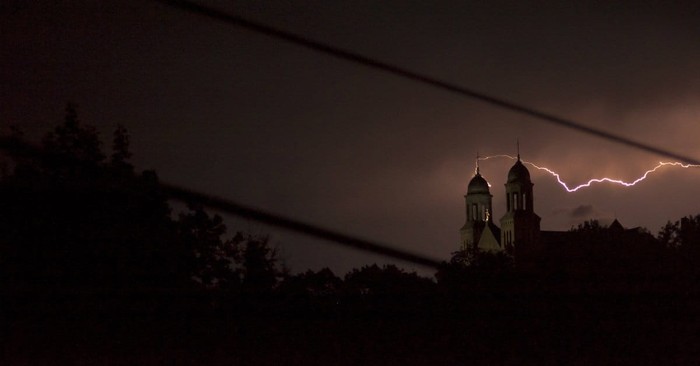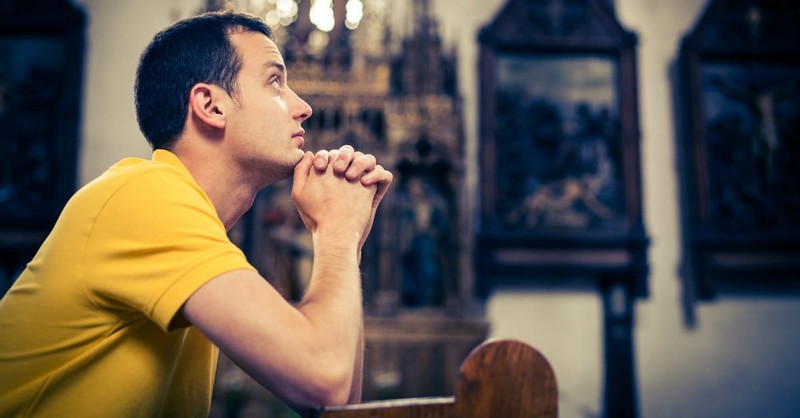
Sometimes it feels as if our world’s imploding—with ongoing threats of nuclear war, hate groups, school shootings, and economic experts predicting financial doom. But what if all this chaos has the capacity for good? What if, contrary to what our fretful brains tell us, God is still in control and is, even now, using everything for our good and to further His kingdom?
The night before His death, and shortly before believers experienced unprecedented persecution, Jesus told Peter that He would build His church and the gates of hell would not overcome it. To the contrary. Throughout Scripture, we see God using the worst of circumstances to reveal His glory and further His kingdom, and He’ll do the same today.
Here are ten ways external chaos can actually help the church.
Photo courtesy: ©Thinkstock/J_GriffithPhotography

1. Worldly challenges center our thoughts on eternity.
Difficulties have a way of slicing through spiritual apathy, busyness, and petty concerns, refocusing on those things that are constant and unwavering.
In Romans chapter 8, Paul, a man who wrote a substantial part of the New Testament, encouraged the persecution believers by reminding them of eternity. In verse 18, he said, “I consider that our present sufferings are not worth comparing with the glory that will be revealed in us.”
When life hits hard, we can focus on the joy that awaits us.
Photo courtesy: Unsplash.com

2. Uncertainty deepens our prayer lives.
When life is going well, I often subsist on shout-out prayers. These quick, relatively shallow snippets of communication aren’t necessarily bad, but they often fail to draw me deep into the heart of God. When tragedy hits, however, my prayers lengthen and become more fervent.
I believe this is true for many of us. King David from Ancient Israel provides a great example of this truth. In the Psalms he wrote numerous heartfelt prayers asking God to be with him, to protect and avenge him, and to remember him according to God’s love and righteousness. We see his desperation for God in Psalm 27:7: “Hear my voice when I call, O Lord; be merciful to me and answer me.”
Photo courtesy: ©Thinkstock

3. World chaos unites believers.
In our opinionated, entitled culture, it’s easy to allow personal preferences and minor differences to divide us. Friendships have been destroyed over bitter arguments on the best way to raise a family, different opinions have fractured ministries, and worship preferences have severed churches. But when we’re going through difficulties or see another brother or sister in Christ struggling, love bands us together.
I saw this in the aftermath of Katrina. Where we lived in Bossier City, Louisiana, churches of all denominations served together, focusing on the needs before them, rather than their doctrinal differences.
Photo courtesy: ©Thinkstock/vadimguzhva

4. Trials force us to rely on God.
I can live much of my life on autopilot—get up, work, make dinner, go to bed, repeat. Even some of my more stressful experiences are relatively manageable. In fact, often, when difficulties arise, my self-reliance increases, pushing me further from God. But when my world shifts past my ability to maintain even a semblance of control, I have no other choice but to rely on God.
It’s when I’ve reached the very end of myself that I discover God’s strength within. That’s when I discover God’s grace is sufficient and His power is perfected in my weakness. (2 Cor. 12:9)
Photo courtesy: Unsplash.com

5. The uncertainty of chaos solidifies God's truth.
Tragedies, wars, and natural disasters can expose areas of deception and doubt. Sickness and death challenges ideas that God will protect us from all harm and that all will go well once we come to Christ. Civil unrest forces us to wrestle with our beliefs regarding the intersection of God’s sovereignty and man’s free will. And often, situations we don’t understand shine light on areas of doubt in need of a deeper understanding of truth.
God showed me this a few months ago after facing a particularly painful disappointment. Initially, I was frustrated with Him, because I knew this was an area He had full power to act but chose not to. I realized I either believed His wisdom was perfect or didn’t, and if His wisdom was perfect and He did everything in love, then this outcome was good as well.
Photo courtesy: ©Thinkstock

6. Worldwide chaos and tragedies inspire outreach.
I am easily distracted and consumed with events going on in my own little world. As a result, I can spend all of my time focused on whatever is occurring right in front of me and lose sight of my ultimate mission of making Christ known. When confronted with human tragedy, however, God’s Spirit within me rises up, reminding me of where mankind’s true hope lies—in Him. Recognizing how fragile and painful our world is motivates me to point others to that which is certain and unchanging.
When chaos reigns, I’m reminded of mankind’s need for Christ and I feel a greater sense of urgency to share His truth.
Photo courtesy: ©Thinkstock/Rawpixel

7. External difficulties result in internal growth.
Scripture makes this clear—God uses trials and temptations to growth His children. In James chapter one, speaking to persecuted Christians scattered throughout Ancient Palestine, Jesus’ brother says, “Consider it pure joy, my brothers and sisters, whenever you face trials of many kinds, because you know that the testing of your faith produces perseverance” (James 1:2, NIV). In Romans chapter 5, Paul tells us perseverance produces character and character, hope. These truths help me view suffering differently, which in turn encourages me to draw closer to God as He carries me through difficulties.
Photo courtesy: ©Thinkstock/Design Pics

8. External chaos helps us prioritize our time.
If we belong to Christ, we’ve got the Holy Spirit dwelling within us, and one of His roles is to align believers with God’s will. This process occurs progressively over time as He shifts our thinking, desires, and priorities to more closely align with His. This process often accelerates during trials and tragedies.
In Matthew 25:31-40 Jesus reveals how closely His heart is twined with the impoverished and hurting, stating that the benevolence we show others reveals our love for Him. If we sense God calling us to help someone but don’t have time, we’ve probably taken on something He hasn’t assigned.
Photo courtesy: Unsplash.com

9. Tragedy, wars, and disasters have the capacity to deepen our compassion.
Whenever I focus on myself and my problems, my selfishness grows and my view narrows. But when there’s a mass shooting or lives devastated by hurricanes, my apathy and self-obsession are challenged. When we encounter the pain of others, we have two options—shut down and avert our attention, fueling apathy; or pause to pray, asking God to stir our compassion for those affected.
Photo courtesy: ©Thinkstock/ka2shka

10. Trials and tragedies reveal the power of the gospel.
Imagine watching a man endure unspeakable torture for his faith in Christ. Imagine a woman showing love to her persecutor, or the falsely imprisoned singing praise songs in the midst of oppression.
The gospel message is one of power and a love so inexplicable, it can only come from God’s Spirit within. When we have every reason to cave but remain standing instead, when we long to curse but we choose to love, and when we give sacrificially despite personal hardships, we reveal Christ in us and invite others to taste His love and power as well. And no matter how crazy our world becomes, we can always trust that God is good, faithful, loving, and sovereign and working all things out for our good and His glory.
Jennifer Slattery is a writer and international speaker who’s addressed women’s groups, church groups, Bible studies, and other writers across the nation. She’s the author of six contemporary novels maintains a devotional blog found at http://jenniferslatterylivesoutloud.com. She has a passion for helping women discover, embrace, and live out who they are in Christ. As the founder of Wholly Loved Ministries, (http://whollyloved.com) she and her team partner with churches to facilitate events designed to help women rest in their true worth and live with maximum impact. When not writing, reading, or editing, Jennifer loves going on mall dates with her adult daughter and coffee dates with her hilariously fun husband.
Photo courtesy: ©Thinkstock/RomoloTavani
Originally published Wednesday, 22 July 2020.








